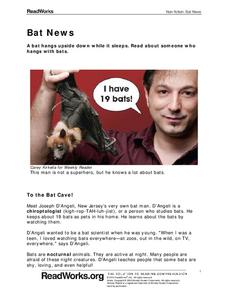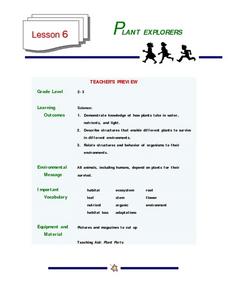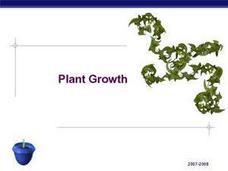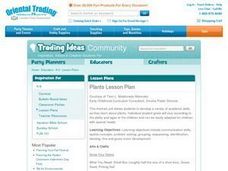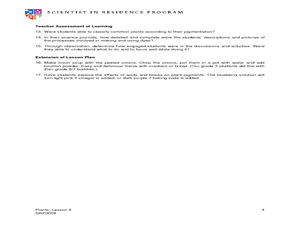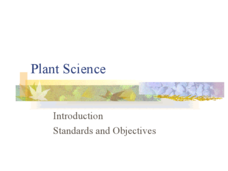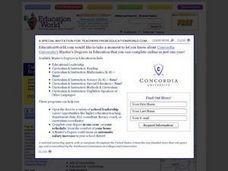It's About Time
Competition Among Organisms
Who knew plants could be so competitive? Join your class as they observe plants competing for space and nutrients. Middle and high schoolers describe possible effects of introducing a new species into an already established ecosystem,...
K5 Learning
The Story of a Wise Woman
The Story of a Wise Woman tells the tale of South Carolina's, Eliza Lucas Pinckney and how she persevered to plant and harvest indigo. With this short story and questions worksheet, your early readers test their comprehension with four...
University of Maryland
Pollination
Sixteen ounces of honey requires more than 1,000 bees traveling over 100,000 miles and visiting 4.5 million flowers. The presentation includes sexual reproduction in plants, the parts and functions of a flower, pollination,...
Curated OER
Plantable Pulp Cards
What a great way to give a gift that keeps on giving! These homemade plantable cards are not only beautiful, but can be planted into the ground to sprout in the right season. Incorporate this project in a science unit, or for a Mother's...
The New York Times
Trouble in the Hive: Researching the Decimation of Honeybee Colonies
Teach your class about colony collapse disorder and foster discussion about causes and solutions for the honeybee problem. Class members read and discuss an article and participate in one of two detailed activities about pollination and...
Oklahoma State University
Hairy Heredity
Young scholars learn that heredity comes down to the flip of a coin with this cross-curricular math and science lesson. Using smiley faces as a model, students toss coins to determine which dominant or recessive traits will be passed on...
Read Works
Bat News
Get the bat facts with a short nonfiction reading passage. After reading the passage, readers respond to questions that focus on main idea, inferencing, vocabulary in context, and author's purpose.
Alabama Learning Exchange
Nature's Life Cycle
Become a member of the Pollution Patrol and stand up to litter! After discussing the life cycle of seeds and discussing how plants figure into the food chain, young conservationists engage in several activities involving podcasts,...
Curated OER
Photo Synthesis and Transpiration
Students germinate pea seeds and plant the seeds. They experiment with different amounts of light and darkness on the plant growth.
Curated OER
Making Pretzels
Young scholars explore how people use plants for food. They use pretzels to see how wheat can be turned into food.
Curated OER
Observing the Growth of a Maize Root
Learners conduct an experiment in order to observe the typical downward growth of a maize root. They become familiar with the root's growth patterns to use as a control for comparison in other experiments.
Curated OER
Planting Rabbit King’s Carrot
Even pirates know not to steal stuff you can make yourself! Read The Pirate's Parrot Stole the King's Carrot to engage your class. Then, plant carrots with your class. If this isn't possible with your kiddos, consider cutting out paper...
Curated OER
Plant Explorers
Students investigate how plants take in water, nutrients, and light. They create artwork showing how plants survive in different environments.
Curated OER
Plant Growth
Examine the growth regions and tissues in plants. The structures and specialized areas of roots, stems, and shoots are defined and supported with diagrams and pictures. Your class will also learn the details of specific growth hormones.
Curated OER
Plant Science Activities
Students complete several plant life activities. For this botany lesson, students practice painting images that resemble plants they are familiar with as well as planting seeds outside of class. Students participate in a dramatic...
Kenan Fellows
Sustainability: Learning for a Lifetime – Soil
Do great gardeners really have green thumbs—or just really great soil? Environmental scholars discover what makes Earth's soil and soil quality so important through research and experimentation. Learners also develop an understanding of...
Curated OER
Heredity Worksheet #2
For this genetics worksheet, students use a diagram showing the genetic offspring of plants with different types of seeds to answer 4 short answer questions. Then students determine the traits of offspring of different crosses in 1...
Curated OER
Plant Growth - Light and Shade
Third graders conduct an experiment comparing plants. In this plant lesson, 3rd graders plant seeds and grow two varieties of plant comparing the light needed for it to grow. Students make predictions and record their observations....
Curated OER
Using Plant Pigments as Natural Dyes
Students create friendship bracelets and quilt squares. In this plant instructional activity student dye their own string and cotton material with plant pigments. Students use the naturally dyed materials to create the friendship...
Curated OER
Sock Walk
First graders, after brainstorming all the ways seeds are scattered and viewing a multitude of examples of seeds, explore how seeds travel by taking a walk outdoors wearing socks over their shoes. In addition, they assess how seeds...
Curated OER
Do They Grow Up or Down?
Students keep a garden journal after planting a garden and discuss environmental stresses put upon the garden for growth. In this garden lesson plan, students plant the plants differently from one another and observe the outcomes.
Curated OER
Plant Science Introduction
A unique PowerPoint explains the basics of plant science. It motivates viewers to study plant science and then lists different food products, biofuels, fibers, timber, and ornamental uses of plants. It concludes with lists of careers...
Curated OER
Why Does the Cocoa Tree Need a Tropical Rainforest to Grow?
Fourth graders explore the requirements a cocoa plant needs to survive. They research where chocolate comes from and how humans can affect the growth of cocoa trees. Students create a 3-D model of a cocoa tree and compare and contrast...
Curated OER
Nuts for Peanuts: Peanut Plants, Peanut Timeline, and Peanut-s-timation!
Students complete a timeline. In this peanuts instructional activity, students read A Short Peanut History and use this resource to make a timeline of the history of the peanut. Students can grow peanuts in the classroom or make various...








